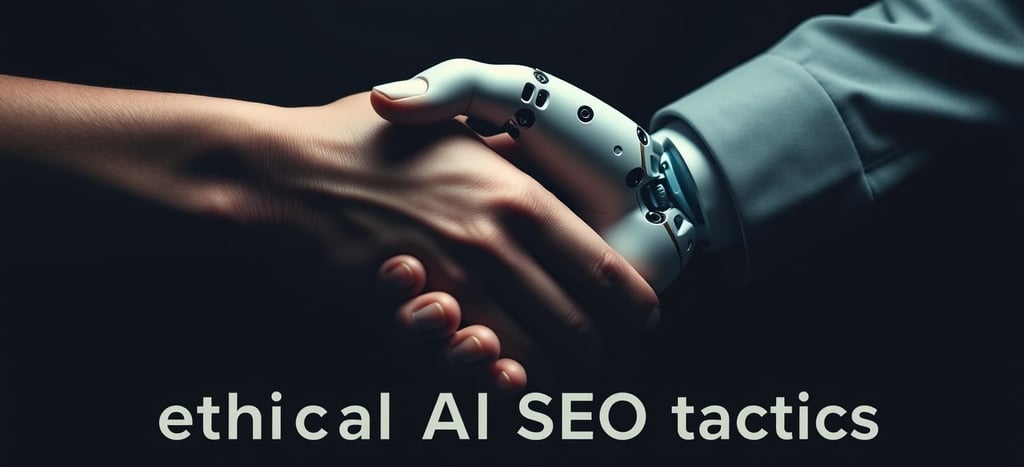Ethical Strategies for Ranking with AI-Powered Search Engines
Building Trust, Delivering Value, and Thriving in the Age of Intelligent Search
1/4/20253 min read


TL;DR: Ethical SEO for AI-Powered Search Engines
AI-powered search engines aren’t just matching keywords—they’re understanding what you mean. To thrive in this new era, businesses must focus on building trust, delivering value, and staying transparent. This means creating user-first content, being upfront about AI usage, protecting user data with strong encryption, avoiding black-hat tricks, and ensuring your digital presence is fair and inclusive. Want to know how to future-proof your SEO game? Let’s dig in.
Introduction: AI Search Isn’t Just Smarter—It’s Wiser
Search engines have grown up. They’re not just looking for keywords anymore—they’re looking for meaning. Thanks to AI, machine learning, and natural language processing (NLP), today’s search engines understand intent, context, and relevance better than ever before.
For businesses, this isn’t a time to cut corners—it’s a time to double down on ethics, quality, and transparency. So, how do you win in this new AI-driven world without resorting to trickery?
Let’s break it down.
1. How Do AI Search Engines Actually Work?
Think of AI search engines as digital detectives. They don’t just match words—they understand what users really want.
What They Prioritize:
Semantic Search: They get the relationships between words, not just the words themselves.
Context Awareness: Search engines use past searches, browsing history, and even current trends to refine results.
User Behavior Signals: Things like click-through rates, bounce rates, and time on page matter.
Content Quality Signals: Expertise, Authoritativeness, and Trustworthiness (E-A-T) guide results.
Pro Tip: Don’t write at search engines—write for people. Use FAQs, conversational tone, and natural long-tail keywords.
2. Content: Write for Humans, Not Robots
If your content feels like it’s been squeezed through a keyword blender, AI (and your readers) will notice.
Value Over Volume: Answer questions, solve problems, and share insights people actually need.
Natural Flow: Write how you’d explain it to a friend over coffee—clear, friendly, and without jargon overload.
Structure It Right: Use H1, H2, H3 headings to guide readers (and search engines) through your content.
Pro Tip: Use tools like AnswerThePublic to uncover real user questions and structure your content around them.
3. Transparency: Be Honest, Be Clear
In an era of AI and automation, honesty builds trust.
AI Disclosures: If AI helped create or refine your content, say so.
Clear Data Practices: Tell users what data you collect and how it’s used.
Easy Opt-Ins and Opt-Outs: Privacy shouldn’t be a maze. Make choices easy.
Pro Tip: Keep your Privacy Policy and AI Usage Disclosures visible and easy to understand.
4. Avoid the SEO Dark Side: Black-Hat Tactics
Black-hat SEO is like junk food—it might give quick results, but you’ll regret it later.
Common Black-Hat Tactics to Avoid:
Keyword Stuffing: Cramming keywords where they don’t belong.
Cloaking: Showing different content to search engines than users.
Hidden Text/Links: Tiny, invisible text packed with keywords.
Buying Backlinks: Paying for spammy, low-quality links.
Pro Tip: Build organic backlinks through partnerships, guest posts, and shareable content.
5. AI is Your Sidekick, Not Your Stand-In
AI is incredible, but it’s a tool—not your entire team.
Set Boundaries: Define how AI fits into your SEO and content strategy.
Audit for Bias: Regularly check AI outputs to prevent unintentional bias.
Blend Automation with Creativity: AI can streamline tasks, but human creativity keeps your content alive.
Pro Tip: Use tools like SurferSEO for keyword insights, but let humans handle the storytelling.
6. Data Privacy: Lock It Down (The Right Way)
User data isn’t just information—it’s trust.
Recommended Encryption Practices:
TLS (Transport Layer Security): Protects data during transmission.
AES-256 Encryption: Safeguards data when it’s stored.
Compliance Standards: Follow GDPR, CCPA, and other local data privacy regulations.
Pro Tip: Make sure your SSL certificates are updated and conduct regular security audits.
7. Fairness & Inclusivity: Build a Digital Space for Everyone
AI tools learn from data—and if that data is biased, the results will be too.
Diverse Training Data: Ensure your AI tools are trained with datasets that represent everyone.
Bias Audits: Regularly check your AI outputs for fairness.
Accessible Design: Follow WCAG guidelines to make your content accessible to all users.
Pro Tip: Use tools like WAVE to identify and fix accessibility issues on your site.
8. Stay Adaptable: SEO Is a Moving Target
The rules of AI SEO are constantly evolving—staying still means falling behind.
Stay Informed: Follow trusted resources like Google Webmaster Blog or Search Engine Journal.
Experiment: Test strategies, measure results, and refine your approach.
Ditch the Shortcuts: If it feels too good to be true, it probably is.
Pro Tip: Conduct quarterly SEO audits to ensure your strategies are aligned with the latest trends.
9. Ethical SEO: A Marathon, Not a Sprint
The best SEO strategies aren’t built overnight—they’re built to last.
Create valuable content.
Be transparent and honest.
Protect user data.
Stay curious and adaptive.
Final Thought: In a world where AI rules search, the brands that feel most human will always win.
Ready to Get Noticed (The Right Way)?
Ethical SEO isn’t just about better rankings—it’s about building trust, creating value, and showing up authentically.
